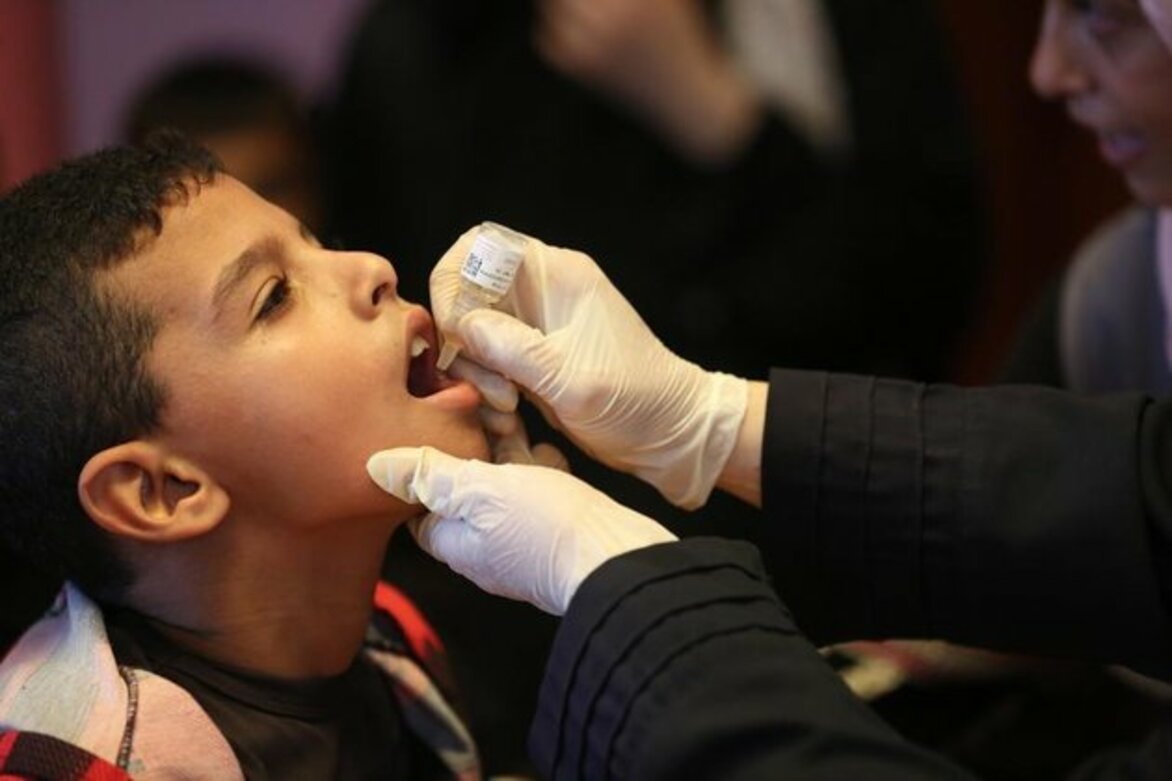More than 160,000 Gaza children vaccinated against polio in 2 days
Xinhua
04 Sep 2024

World Health Organization (WHO) Director-General Dr. Tedros Adhanom Ghebreyesus reported an estimated 74,000 children were vaccinated on Monday, for the two-day total of more than 160,000. UNITED NATIONS, Sept. 3 (Xinhua) -- UN humanitarians said on Tuesday that more than 160,000 children under 10 in central Gaza have received the poliovirus vaccine in the first two days of a six-day campaign. However, the UN Office for the Coordination of Humanitarian Affairs (OCHA) said that while local pauses in the conflict enabled launching the emergency polio vaccination campaign on Sunday, which aimed to reach more than 640,000 children, violence continued in other parts of Gaza. "Israeli bombardments, ground operations and heavy fighting continues in multiple areas, resulting in further civilian casualties, displacement and destruction of houses and other civilian infrastructures," OCHA said. "Families continue to flee and find themselves in overcrowded areas with inhumane living conditions, which, coupled with the lack of clean water, sanitation facilities and basic hygiene items, contribute to the spread of diseases." The office said World Health Organization (WHO) Director-General Dr. Tedros Adhanom Ghebreyesus reported an estimated 74,000 children were vaccinated on Monday, for the two-day total of more than 160,000. The vaccination campaign, first concentrating on Gaza's central area, followed by the southern and then northern zones, was mapped out after a 10-month-old was partially paralyzed by the disease, possibly contracted from the inhumane sanitation conditions in most regions. "Parties must always respect international humanitarian law," OCHA said. "This means that civilians must be protected and their essential needs -- including food, shelter, water and health -- must be met, wherever they are in Gaza." The humanitarian office said its local partners, in collaboration with the United Nations Children's Fund (UNICEF), repaired the primary water transmission line running from Israel to Khan Younis, which had been damaged during recent military operations, leading to the partial restoration of water services in several areas, "including Al Mawasi where hundreds of displaced people are living in unbearable conditions." UNICEF reported that with its partners, it delivered more than 12,000 liters of essential supplies for water disinfection to the Gaza City and Jabalya municipalities for the first time in three months. However, the global water and sanitation conditions in Gaza continue to be dire, with services hampered by the destruction of water and sanitation facilities, restricted access and limitations of essential resources. OCHA warned that with the first seasonal rainfall this past weekend, more than one-third of the population is in flood-prone areas. Local authorities and humanitarian partners worry seawater will flood tents along the beach and are concerned that damage to rainwater and sewage networks will result in additional flooding. The office said that UNICEF, along with OCHA, the UN Development Programme and non-governmental organizations, assessed the water, hygiene and sanitation situation in four displacement sites located in flood-prone areas in Khan Younis and Deir al Balah. OCHA said that insecurity and access restrictions continue to jeopardize humanitarian operations. Since January 2024, 16 incidents involving UN vehicles being directly hit have been recorded in Gaza. "It bears reminding that safe, unimpeded and predictable humanitarian access is critical to save lives and deliver basic assistance across the (GAZA) Strip," OCHA said. The humanitarian office said that in the West Bank, the continued use of lethal war-like tactics by Israeli forces, including airstrikes, is killing, injuring, displacing or depriving people of access to basic services. Operations resumed in Tulkarm while continuing in Jenin. The United Nations has recorded more than two dozen fatalities over the past week, including children. OCHA mobilized UN organizations and others to assess damages and humanitarian needs. Visiting Tulkarm on Saturday, they confirmed the displacement of 120 people, including over 40 children, whose homes were destroyed. The office said 13,000 people in the Nur Shams refugee camp suffered water cut-offs, attributed to damages caused to the water network, triggering sewage overflow. The teams also noted a traumatized population in need of psychosocial support. OCHA said the multiple organizations it mobilized to carry out assessments in Jenin were denied access by the Israeli authorities. The office warned that access impediments impact the ability to provide a meaningful humanitarian response. The movement of ambulances and medical teams has been impeded and delayed since the onset of the now-week-long operation. "Humanitarian access must always be facilitated," OCHA said. 


